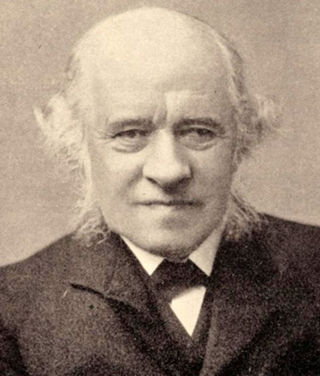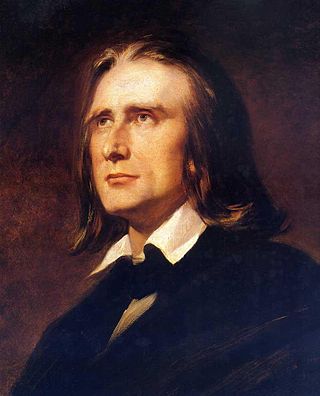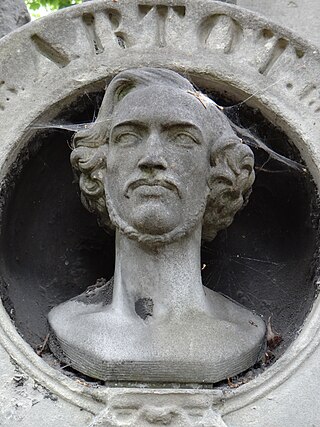Related Research Articles
Overture is a music instrumental introduction to a ballet, opera, or oratorio in the 17th century. During the early Romantic era, composers such as Beethoven and Mendelssohn composed overtures which were independent, self-existing instrumental, programmatic works that foreshadowed genres such as the symphonic poem. These were "at first undoubtedly intended to be played at the head of a programme".

Sir George Grove was an English engineer and writer on music, known as the founding editor of Grove's Dictionary of Music and Musicians.

Sir George Alexander Macfarren was an English composer and musicologist.

August Wilhelm Julius Rietz was a German composer, conductor, cellist, and teacher. His students included Woldemar Bargiel, Salomon Jadassohn, Arthur O'Leary, and Sir Arthur Sullivan. He also edited many works by Felix Mendelssohn for publication.

Ureli Corelli Hill was an American conductor, and the first president and conductor of the New York Philharmonic Society.

The symphonic poems of the Hungarian composer Franz Liszt are a series of 13 orchestral works, numbered S.95–107. The first 12 were composed between 1848 and 1858 ; the last, Von der Wiege bis zum Grabe, followed in 1882. These works helped establish the genre of orchestral program music—compositions written to illustrate an extra-musical plan derived from a play, poem, painting or work of nature. They inspired the symphonic poems of Bedřich Smetana, Antonín Dvořák, Richard Strauss and others.
August Conradi was a German organist and composer.
Karl Anschütz was a German-born musical director and composer who founded the German Opera in New York City. He was the son of Josef Andreas Anschütz and the brother of Hermann Anschütz.
The Mendelssohn Scholarship refers to two scholarships awarded in Germany and in the United Kingdom. Both commemorate the composer Felix Mendelssohn, and are awarded to promising young musicians to enable them to continue their development.

The New Philharmonic Society was a British music society, established in 1852, giving annual series of subscription concerts of orchestral music in London until 1879. The concerts in the first season were conducted by Hector Berlioz.

The Concerts of Antient Music, also known as the Ancient Concerts or The King's Concerts, were an influential concert series put on annually in London from 1776 to 1848. The concerts consisted solely of music composed at least twenty years previous. The concerts had aristocratic or royal sponsorship and featured some of the best musicians of the day. At first twelve concerts were given each year; in 1785 a thirteenth concert, a performance of Handel's Messiah to benefit retired musicians, was added at King George III's command.

Alois Ander was a German operatic tenor, active in Vienna in the middle of the nineteenth century. In 1900, Carl Ferdinand Pohl called him "one of the most famous German tenor singers of recent times."

Alexandre Joseph Artôt was a Belgian violinist.
The "Professional Concerts" were subscription concerts established in 1783 and given at the Hanover Square Rooms in London. Leading musicians of the day performed at the concerts.

Anne Arsène Charton-Demeur was a French opera singer. Classified by different authors as a soprano or a mezzo-soprano, she appeared in leading roles in many operas, particularly in the original productions of Berlioz's operas Béatrice et Bénédict and Les Troyens.

Eugène Léon Vivier (1821–1900) was a French horn player, admired by Napoleon III.

The Handel Festival of 1857 was a series of concerts of music by George Frideric Handel, given by a large orchestra and chorus at the Crystal Palace in London. Its success led to the Triennial Handel Festival, held at the same venue, which continued until 1926.
Henri Warnots was a Belgian operatic tenor, composer and academic.
Mary Anne Wilson was an English opera singer.

Louise Harriers-Wippern was a German operatic soprano. She was a member of the company at the Royal Opera in Berlin, and appeared for three seasons in London.
References
- 1 2 3 Chitty, Alexis (1900). . In Grove, George (ed.). A Dictionary of Music and Musicians . London: Macmillan and Company.
Attribution
- This article incorporates text from a publication now in the public domain : Chitty, Alexis (1900). . In Grove, George (ed.). A Dictionary of Music and Musicians . London: Macmillan and Company.